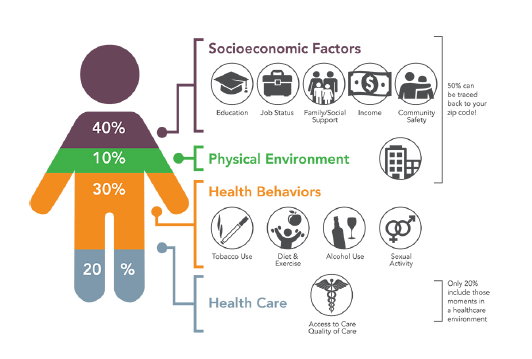In Australia, 12 million people have chronic conditions like heart disease, stroke, cancer, diabetes, asthma and mental illness. Many have more than one and they are often interlinked. These are long-term conditions that have a huge impact on people’s lives, our health system and the economy. They are often described as ‘lifestyle diseases’ that are preventable through healthy living.
However, this oversimplified view fails to acknowledge that much of the cause of chronic disease is linked to environmental, economic and social factors, and strongly influenced by social disadvantage: 85% of early deaths from chronic diseases occur in disadvantaged communities.

Research shows that lifestyle factors make up only 30%, while socioeconomic factors like income, housing, our language skills, create 40% of our health. Healthcare only contributes 10% towards our health outcomes, but money continues to be directed to healthcare and medical research, because social disadvantage is much harder to change and to measure.
Asthma Australia is tackling this very issue and investigating a new approach to community wellbeing. In public health, we tend to focus on the specific diseases a person has and treat these as separate conditions, but the lived experience of most people with chronic disease is more complex than this. Many people have multiple conditions that intersect with other areas of their lives such as social issues, economic constraints, culture, family demands and access to suitable healthcare. These factors influence the development of chronic diseases, their effective management and the impact that chronic disease has on a person’s life.
Turning the tide on chronic disease will require complex prevention strategies that take a whole-of—community health and wellbeing approach. These strategies require long-term funding, and many organisations working together in genuine collaboration.
“Much of the work of health promotion and prevention activities is built on the assumption that disease diagnoses are the key determining factors. However, our research with the Culture Well project really showed me that a person’s cultural identity is a stronger determinant of the barriers and enablers of health and wellbeing that what disease they have.” Dr Luke Craven.
Reference: 1D. R. Williams, M. V. Costa, A. O. Odunlami& S. A. Mohammed., ‘Moving Upstream: How Interventions That Address the Social Determinants of Health Can Improve Health and Reduce Disparities’, Journal of Public Health Management Practice, 14/6 (2008), 8.





 1800 278 462
1800 278 462



